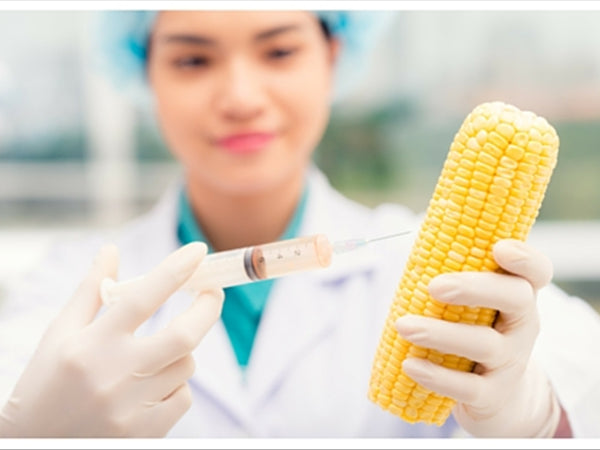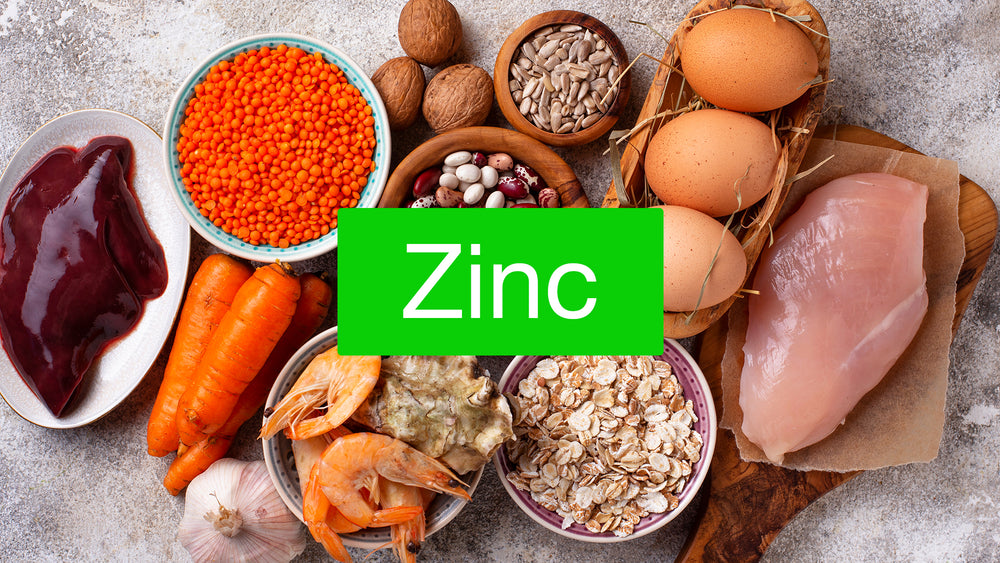When foods or organisms have been genetically manipulated in a laboratory to create cheaper imitations of natural foods like tomatoes, lemons or corn, they’re called genetically modified foods or GMOs. These genetically-modified organisms create unnatural combinations of plant, animal and bacterial genes that don’t occur outside of the lab.
Genetically modified foods (GMOs) consist of high-risk foods currently in commercial production and foods with a monitored risk due to suspected or known contamination.
According to the Center for Food Safety, 60% to 70% of processed foods are genetically modified. Scientists first experimented with genetically-modified foods in the 1980s. The “Flavr Savr” tomato,the first GMO food marketed for human consumption, hit shelves in 1994. The “Flavr Savr” failed, but that didn’t stop biotech companies from producing other GMO foods, including corn, cotton and soybeans.
Are GMO Foods Bad for Your Health?
Many natural health experts believe regular consumption of GMO foods may cause acid reflux, chronic constipation, Crohn’s disease and diabetes. These health problems have increased drastically since GMOs were first introduced to the food supply in the 1990s. Although the FDA hasn’t issued any warnings about eating GMO foods, scientific research, including a 2011 Canadian study that found GMOs in pregnant women and fetuses,indicates otherwise.
According to this article, GMO producers insist any toxins from genetically-engineered foods are killed in the gut. Other GMO foes believe GMOs are partially responsible for the rise in autism. So the debate rages on between pro-GMO and anti-GMO forces.
High-risk foods known to be in commercial production include the following 15 GMO foods:

Canola
Before you buy canola oil to use for cooking, consider the following:
About 90% of the canola grown in the U.S, is genetically modified. Information presented at the annual Ecological Society of America conference in 2010 showed most of the wild canola plants in North Dakota (where 90% of the U.S. canola crop grows) contain artificial genes. This indicates GMO-altered plants aren’t limited to crops – they’re spreading out into wild plants.
Environmentalists don’t believe the errant canola plants pose a problem, but they do demonstrate how easily GMO plants can sprout beyond an “official” crop.

Corn
About 85% of the corn produced in the US is GMO. Even some corn flake brands have been found to use genetically-modified corn. Food producers modify corn crops to protect it from herbicides.
Most GMO-corn in the US is used for ethanol or animal feed, but GMO corn has now been introduced into the human food supply. Monsanto recently debuted genetically-engineered sweet corn, which is sold in Wal-Mart and other outlets. Whole Foods and Trader Joe’s customers successfully lobbied to prevent the chains from carrying GMO corn.
GMO sweet corn is herbicide resistant, and it’s found in processed and canned corn as well as fresh produce. Use this search form to locate verified non-GMO sweet corn.
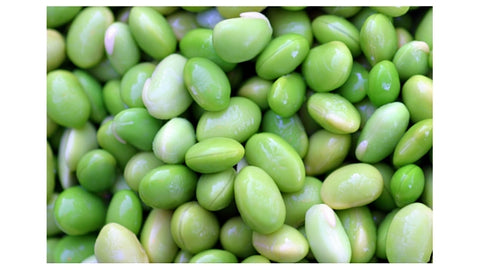
Soy
Soy is supposed to be a substitute for red meat but it may be just as harmful to your health as traditional main dishes. Most soybean crops in the U.S. are genetically-modified.
The components in GMO soy can increase the chance of allergies, breast cancer and endocrine cancer. They may cause Vitamin B12 or protein digestion deficiencies, or block estrogen production. A Russian study on three generations of hamsters showed rodents fed GMO soy had higher rates of sterility and infant mortality.
Look for an organic/non-GMO label when buying soy.

Alfalfa
Alfalfa, a herb used to feed cattle, is also harvested as hay or turned into silage. Predominately grown in the western US, there’s evidence that GMO alfalfa has grown wild and intermingled with traditional alfalfa, in a way similar to what’s happened with canola. A 2015 USDA study shows GMO alfalfa has infiltrated non-GMO fields.
Some GMO alfalfa has been treated with Monsanto’s controversial herbicide Roundup. China refused a 2014 shipment of alfalfa because it tested positive for Roundup. The U.S. farmers and exporters handling the alfalfa thought they were shipping traditional alfalfa – they had no idea cross-contamination occurred.

Papaya
According to some estimates, as much as 77% of Hawaii’s papaya crop is genetically modified. The switch occurred after an epidemic of ringspot virus in the 1990s. Scientists developed the Rainbow Papaya, which is resistant to the bacteria, in 1998. Rainbow Papaya has accounted for most of the crop since then.

Sugar Beets
The sugar you put in your coffee or tea is probably made from sugar beets, and 90% of sugar beets are genetically modified. Almost 8.8 million tons of sugar were produced in the U.S in 2015, 60% from GMO sugar beets. Consumers, especially Millennials, have voiced their displeasure at this trend. Hershey, Chipotle and General Mills are just a few of the companies dropping (or promising to drop) GMO sugar beets from their ingredient list. Hershey stopped using sugar from GMO sugar beets in 2015, and transitioned back to using only natural cane sugar in Kisses and many other products.
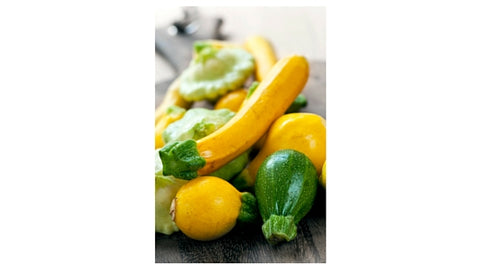
Zucchini/Yellow Squash
Two species of yellow squash and zucchini commonly sold in the US are genetically engineered. These vegetables are often affected by fungal infections and viruses, and genetic modifications eliminate this problem.

Canned Soups
Processed or canned soup may contain several ingredients derived from GMOs.
The vegetable oil in many canned soups may be derived from GMO cottonseed, canola or soybeans. This isn’t always evident on the label, so choose non GMO or organic brands or make homemade soup with fresh ingredients.

Frozen Foods
Check labels for GMO ingredients. Most frozen fruits are vegetables are GMO free, unless they include yellow squash, zucchini, papaya, corn or soybeans. Look for organic or non-GMO labels on packages.
Frozen fruits or desserts may be sweetened with high-fructose corn syrup (HFCS). This man made sweetener resembles table sugar chemically, but it’s derived from corn starch. Starch consists of simple sugars (glucose molecules) strung together. When these molecules are separated, the starch turns into full, bonded glucose during the manufacturing process and the result is high-fructose corn syrup.
Unlike sucrose (sugar), HFCS contains water. It also differs from table sugar in that there’s no bond between glucose and fructose. When you eat table sugar, there’s a chemical bond joining the fructose and glucose. The enzymes in your gut and stomach acid break down this bond as you eat.
The most common types of high-fructose corn syrup are 42% HFCS, used in processed foods and baked goods. The second types, 55% HFCS, is used primarily in soft drinks. Consuming too much high-fructose corn syrup can increase the chance of weight gain and obesity, increase the risk of Type-2 diabetes, and elevate your LDL “bad” cholesterol levels, which may cause hypertension and heart disease.
Avoid additives. GMO corn, sugar beets, cotton and soy often end up as thickeners or flavoring agents in packaged or frozen foods. Check ingredient lists and choose non-GMO or organic foods.
Milk, cheese, pork, beef and chicken may be from GMO-fed animals. Look for organic or non-GMO verified foods when purchasing these products.
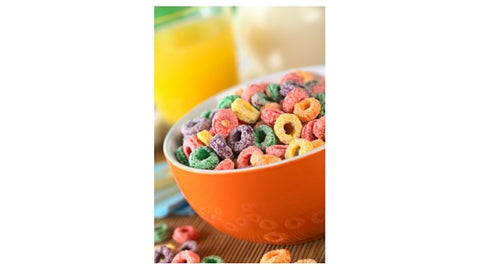
Cereal
Sugary breakfast cereals have always incurred the wrath of health experts, and now there’s yet another reason to be wary of them. A list of breakfast cereals made with GMO corn contains some well-known brands. Popular breakfast cereals and breakfast bars from the supermarket are likely to contain GMO corn, soy or sugar from sugar beets. Check labels or buy verified, non-GMO brands.
Tip: Don’t assume a cereal is non-GMO because it has the word “Natural” on the box. Even some highly-regarded “healthy” brands have been shown to contain GMO corn and other genetically-modified ingredients or pesticides. Read labels and look for cane sugar and other natural ingredients to make sure you’re buying a non-GMO- product.

Milk and Dairy Products
Dairy farming operations feed cows with GMO corn, so it’s likely some of those genetically-modified substances end up in your milk or cheese. Recombinant bovine growth hormone (RBGH), a laboratory variation on a natural hormone given to cows to produce more milk, is used in up to 40% of milk sold in the U.S. (It’s banned in the European Union, New Zealand, Australia and Canada.)

Potatoes
Innate potatoes, a genetically-modified version of Russet potatoes, were developed by a researcher at Michigan State University, and Idaho’s Simplot Co. plans to sell them. Innate GMO potatoes bruise less than traditional potatoes and release less of the harmful chemical acrylamide when cooked. Acrylamide has been shown to cause cancer in rats, but there’s no link to acrylamide and cancer in humans.
Many companies, as well as consumers, don’t trust GMO produce, even when it’s said to offer benefits not found in traditionally grown crops. Despite the potential advantages offered by Innate potatoes, Frito-Lay and other companies are hesitant about using these GMO potatoes in their products.
Peas
GMO peas aren’t as abundant as genetically modified corn or soy, but they do exist. Scientists place kidney bean genes into peas to create a protein doubling as a pesticide. Mice fed genetically-altered peas caused experienced lung damage and tissue irritation similar to human asthma.
Aspartame
The artificial sweetener aspartame is made by combining two amino acids, aspartic acid and phenylalanine. It’s sold as a low-calorie sugar substitute for coffee and tea and used in packaged foods and sodas. Aspartame is sold under the brand names NutraSweet® and Equal®. The FDA and European Food Safety Authority (EFSA) have both cleared aspartame as being safe for human consumption.
The 1981 patent for aspartame, now available online, shows that it was created from genetically-altered E.coli bacteria. The amino acids, aspartic acid and phenylalanine, are then formed from the bacteria’s excretion. In the patent’s text, aspartame’s creators claim aspartame is sweeter than sugar and is a promising substitute for natural cane sugar.
Given how aspartame is made, it’s no surprise many people refuse to use the product, despite assurances from the FDA regarding its safety.
Soda
Soda is considered one of the worst beverages on the market for your health, and not just for its calorie content. Even diet soda may have long-lasting ill effects on your health and contribute to obesity.
Many sodas contain two harmful GMO ingredients – high-fructose corn syrup (HFCS) and aspartame. Even sodas with sugar instead of corn syrup or aspartame may contain sugar sourced from GMO-modified sugar beets.
There are few examples of safe and healthy soda. To avoid GMOs in your daily beverages, you may want to make your own smoothies at home.
How to Shop if You’re Avoiding GMOs
It’s impossible to avoid GMO foods completely regardless of where you shop. Government regulations don’t require disclosure of GMO foods on ingredient labels. Many stores do prohibit sales of foods with high-fructose corn syrup, flavorings, colorings and other artificial ingredients. These ingredients are also found on many food labels, so you can avoid them quite easily.
Fresh produce is usually GMO-free, unless you’re buying corn, papaya or one of the other main offenders. Frequent a local farmer’s market for some assurance of non-GMO produce.
Dry beans, grains, nuts and seeds are free of GMOs. Check labels and buy unsalted, unprocessed items.
A few more tips on buying GMO-free foods:
- Look for a Non-GMO label indicating a 3rd party has verified the food as safe
- Buy organic foods
- Choose farmed clams, mussels or oysters
- Buy responsibly caught fish. Ask your grocer where the fish was caught (or farmed) and if it’s sustainable
- Avoid products containing soy lecithin and soy isolates
- Choose non-GMO, heart-healthy olive oil over canola, corn and soybean oil
- Look for whole grain breads instead of crackers and bread made with refined flours. White or refined flour breads contain corn syrup or soy-based ingredients
Avoid sprinting out to the convenience store for packaged foods or soda. Buy groceries at a health-oriented, local market or the organic/health food section of a large supermarket for a better selection of non-GMO foods.
Do you have a favorite local health food store or product that is GMO free? Please share. We would love to know.

